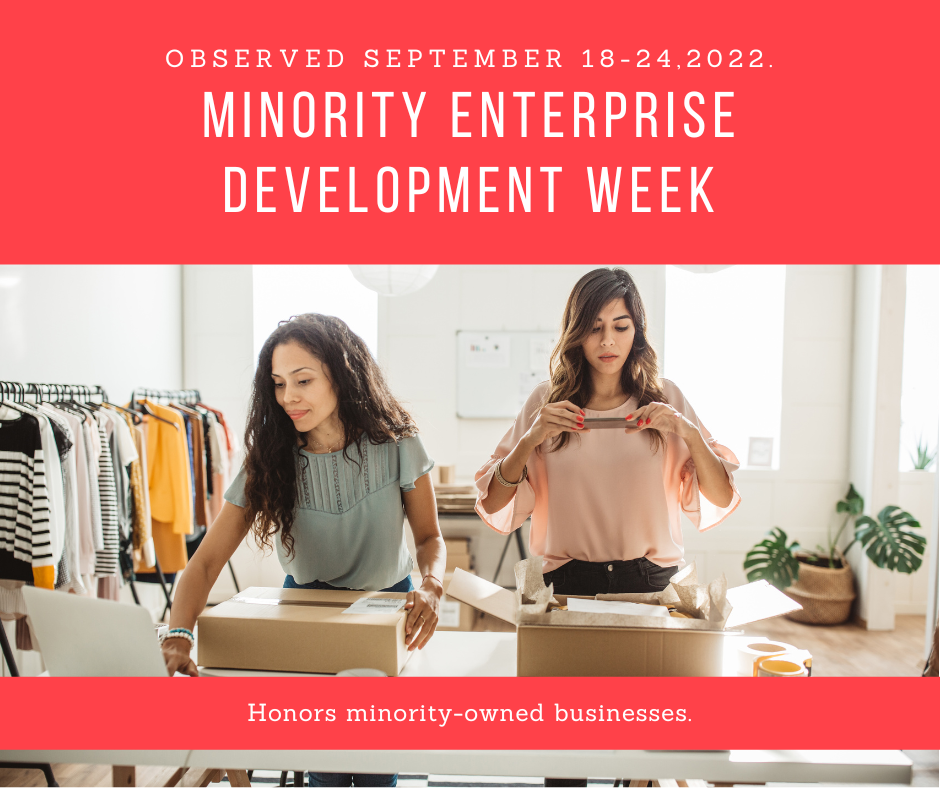There are 1.07 million minority-owned firms in the United States with 9.3 million employees and $344.5 billion in annual payroll, according to the 2019 Annual Business Survey.
The U.S. Census Bureau offers the statistics among data the agency has collected in observance of Minority Enterprise Development Week, Sept. 18-24, 2022. The week recognizes the achievements and contributions of the minority business enterprise community.
The Minority Business Development Agency of the U.S. Department of Commerce provides some insight into why minority enterprise is vital to the U.S economy.
"By 2044, the Nation's prosperity will rely even more on minorities, the fastest growing segment of the population," according to Vital to Making America Great, a report from the Minority Business Development Agency. "Entrepreneurship is a sure pathway to wealth creation and a thriving national economy. Today, U.S. minority business enterprises represent 29% of all firms but only 11% have paid employees. If MBEs were to obtain entrepreneurial parity, the U.S. economy would realize 13 million more jobs."
The report outlines the agency's programs to generate new jobs, investments, firm creation, and economic investments within the minority-owned business community. The agency's initiatives are having an impact.
For every federal dollar spent, the agency gets one of the highest returns for business assistance in the federal government, according to the report. Programs and services of the agency have secured more than $40 billion in contracts and capital over the last decade, with increased performance averages and returns on investment.
Minority business owners face challenges, however. According to the agency, most are smaller in size and scale than their non-minority counterparts. That's not all.
"The gap in combined gross receipts is 10:1, with only 2% of minority firms generating gross receipts of more than $1 million and only 11% of minority-owned firms with paid employees," according to the report.
When it comes to capital, minority-owned firms are also:
- more likely to be denied loans at a rate nearly 3x's higher than non-minority firms;
- likely to pay higher interest rates; on average 7.8%, while non-minority firms pay on average 6.4; and
- less likely to receive loans, and when approved, receive lower loan amounts.
When it comes to contracts, minority-owned firms secure a lower number and dollar amount in proportion to the number of available minority firms in the relevant market. Pervasive barriers cited in contract disparities studies include:
- access to capital;
- large contract sizes;
- network access; and
- marketplace inequities.
The Minority Business Development Agency is the only federal government agency dedicated to the growth and global competitiveness of minority business enterprise. Among its services are providing access to market-based financial solutions, facilitating mergers and acquisitions, partnering with private Fortune 500 firms to provide global supply chains, transitioning minority 8(a) firms into the private sector, and developing policy recommendations to address minority business equity.
Minority Enterprise Development Week
Every president of the United States recognizes Minority Business Development Week each year through a presidential proclamation established by Ronald Reagan in 1983. The Minority Business Development Agency formally observes Minority Enterprise Development Week, AKA MED Week 2022, and hosts an annual conference.
Besides celebrating the achievements of minority-owned companies, the conference provides informational sessions, programming, and interactive networking opportunities. Also, individuals and organizations who have made exceptional contributions to minority business growth will receive awards.
This year's MED Week 2022 conference will be held on-site in Washington, DC, and virtually. The conference theme is "Power in Capital, Strength in Equity."
In-person registration is closed, but it isn't too late to register for the live stream here.
Pension Funds and Diversity Investing
Beyond MED Week 2022, the pension industry can find resources to improve its diversity initiatives regarding investments and best practices.
Concerning promoting diversity, equity, and inclusion, pension systems are also taking steps to evaluate their programs and seem to be leading the pack among asset owners. A 2021 Morgan Stanley study, Asset Owners and Investing in Diversity: Intention Versus Action, surveyed asset owners - investment decision-makers at large U.S pension funds, endowments, foundations, and insurance companies - to get a better understanding of the role of diversity in their investment decisions and choice of external managers.
The survey revealed that diversity is a top priority for investment decisions among asset owners. Despite prioritizing diversity and acknowledging that diversity can enhance investment performance, most asset owners claim that incorporating diversity into investment decisions compromises returns.
However, public pension funds appear to be an industry example. Public pension funds, according to the Morgan Stanley study, "are much more likely than their peers to value diversity in investment decisions, perhaps due in part to their own diversity and longer exposure to diverse investment teams."
The study's researchers indicate that the surveyed public pension fund asset owners are more diverse by gender and race than other asset owners. According to the survey, 47% of public pension fund asset owners indicated that the diversity of investment teams has always been a priority for their organizations, compared to 7% of other asset owners.
Also, the public pension fund asset owners benefited from more established processes around diversity, with 63% saying their organizations always included questions about diversity in their due diligence processes when deciding to invest with an external manager, compared with 30% of other asset owners. The survey also indicates that public pension fund asset owners are especially likely to ask questions about external managers' formal mentorship programs, the retention rate for women and multicultural employees, and the diversity of new hires.
Another critical insight from the Morgan Stanley survey is the need for stronger accountability. According to the report, when it comes to diversifying pension funds and investing, there is always room for more formalization, standardization, best practice sharing, and accountability measures.
About the Author: Allen Jones is director of communications and event marketing for TEXPERS.

